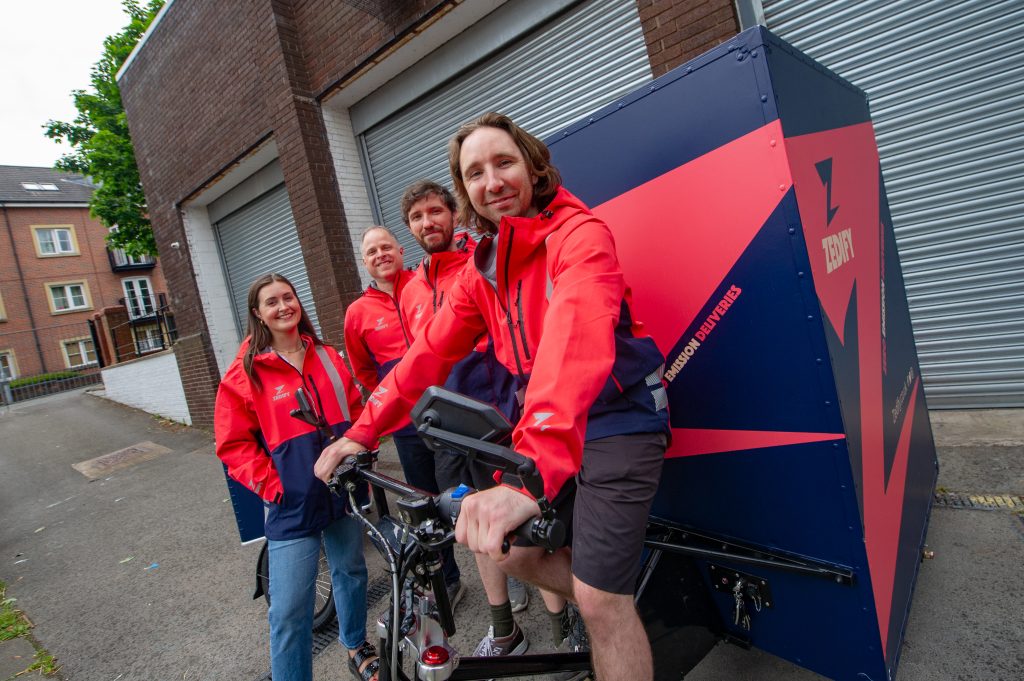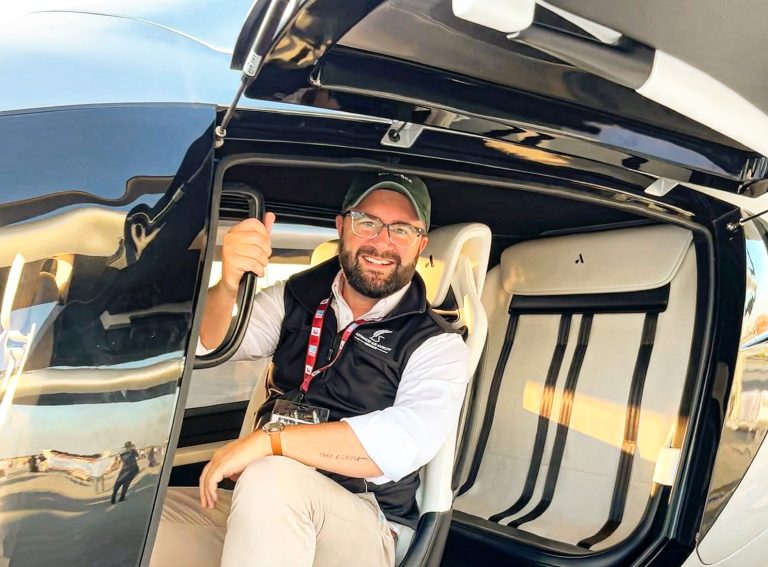After helping to bring last mile cargo bike deliveries into the mainstream in Cambridge, Bristol, London and several other UK cities, Manchester is the new frontier for Zedify.
Over the next few months, the delivery firm will establish its service in the city, recruit a team of riders, and add local retailers to its network.
Founded in 2018 by Rob King and Sam Keam, Zedify is creating a UK-wide cargo bike logistics network, after initially launching the UK’s first service of its kind in Cambridge back in 2005, and today they are in 12 cities.
Zedify now boasts partnerships with national logistics firms including FedEx and DPD and international retailers such as Zara.
COO James Nellist joined the organisation in 2020 with a background in logistics and has since set about trying to reinvent the way that last mile deliveries are made in the UK.
“I realised that what Zedify offers could lead to a disruptive reimagining of a sector that was stuck in its ways,” he tells Zag Daily.
“Within 18-24 months we expect to be at around 190,000 deliveries, about twice what we currently deliver in Bristol each year. If we hit that we’ll be looking at annual CO2 savings of around 67 tonnes.”
Why Manchester?
Last mile delivery on cargo bikes is ideally suited to cities due to their dense populations, busy main roads, and winding alleys and streets. In this environment, cargo bikes can move from delivery to delivery much quicker than the alternatives.
With a presence in London already, Manchester was a clear choice as the next city for Zedify to establish its services. Birmingham will also be added to its network shortly afterwards.
“You can deliver on a cargo bike more economically than you can with a van,” Nellist says.
“A diesel van will travel a long distance and tour around the city, typically sitting in traffic. A cargo bike though can use the cycle infrastructure and when we have done trials with clients, for example with a leading food subscription brand, we can see deliveries per hour increase by 30%. It doesn’t have to be the way it’s always been – there is a different way of doing things that can enhance the city.”
With experience taken from a number of different cities around the UK, Zedify wants to offer its service to local and national businesses alike in Manchester.
“We want to replace a lot of delivery vans from national carriers,” says Nellist.
“But local businesses in Manchester will also have a genuine alternative moving forward, as well as the changes that will happen overnight such as Zedify replacing FedEx or DPD vans or delivery for a retailer like Zara. We want to bring national expertise but with a local presence that has capacity for all businesses.”
Establishing a service that works
Zedify has conducted extensive data analysis ahead of this launch to ensure it can offer as comprehensive a service as possible. Nellist believes this will allow its riders to target high demand areas more easily.
“We have done a lot of analysis and spoken with clients and retailers about where the pain points are,” he explains.
“Our microhub is in the southeast of Manchester which can serve the city centre as well as residential areas which were flagged in our data as having high delivery volume. This means that we can facilitate the entire city but will also be closer to where the highest concentration of work is.”
The increased load capacity of Zedify vehicles also allows individual riders to complete deliveries for logistics firms and local businesses at once, seamlessly.
“Most of our fleet is made up of trike vehicles, with a larger two cubic metre box at the back that could contain all the deliveries for a FedEx round for one day,” Nellist adds.
“This allows us to do multi-drops, where our riders can use multiple platforms and deliver based on the expectations of several companies. All items and retailers are slightly different, but we have the expertise and capability to meet these differing standards.”
Building a great team
Recruitment for Manchester riders has already begun, with training set to take place in July before the first orders are sent out in August.
Zedify expects to have around 16 riders employed in Manchester within 18 months, although that could rise if it integrates another national logistics client.
“We have also recruited a manager for our Manchester operations who will do six weeks of training prior to starting, which includes riding for different carriers in other cities to familiarise themselves with the various platforms,” Nellist explains.
“We’re a real living wage employer and really care about our riders. Training and quality of doorstep experience is important to us.”
Dan Coyne, Zedify’s new Manchester Hub Manager, told Zag that his vision for a successful opening revolves around the pursuit of two objectives.
“Firstly, recognising the significance of building a strong local presence in Manchester, I aim to employ a multifaceted approach to both establish partnerships with amazing Mancunian businesses and engage with the local community,” said Coyne.
“Secondly, at Zedify we are dedicated to fostering a sustainable urban ecosystem that prioritises environmental responsibility. I believe it’s important to educate and inspire the local community about how to sustainably do business in the modern world and how Zedify plans to disrupt Manchester’s urban logistics for the better.”

To ensure its team can operate efficiently, Nellist projects that a second microhub could open in Manchester within two years.
“Our growth will depend on several different factors, but ideally, we hope to branch out into a second hub in the next 18 months, which is likely to happen in Bristol as well,” he adds.
“Cycling more than 20 minutes across the city can be prohibitive so it is best to have that second hub once the quantity of deliveries begins to scale.”
Mission-led
Nellist is proud of Zedify as a “mission-led organisation” that is set on replacing polluting vans with cargo bikes across the UK.
This goal has not been satisfied with a presence in just 12 cities though, with Birmingham already on the horizon and moves into Leeds and Liverpool as well as further growth in London also in the company’s scaling plans.
“We can become the first national provider to do large volumes of final mile delivery on cargo bikes,” he says.
“It’s a great sector with lots of people working in lots of different cities, but we want to be that national player. Zedify aims to cover 20% of the nation’s sustainable delivery needs by 2025. Cargo bikes cannot deliver to the villages in Oxfordshire or Inverness, but they can serve the densely populated areas where it is a genuine alternative.”





